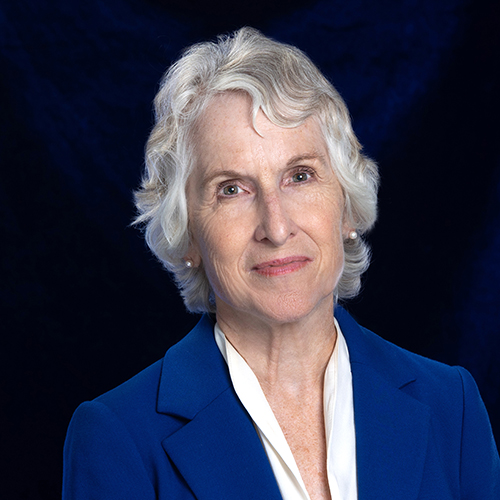 Susan Lozier is dean and Betsy Middleton and John Clark Sutherland Chair in the College of Sciences at Georgia Institute of Technology. She serves as the chief academic officer of the College and provides leadership to more than 3,500 students and 500 faculty members and researchers across six internationally ranked schools.
Susan Lozier is dean and Betsy Middleton and John Clark Sutherland Chair in the College of Sciences at Georgia Institute of Technology. She serves as the chief academic officer of the College and provides leadership to more than 3,500 students and 500 faculty members and researchers across six internationally ranked schools.
An active researcher, Lozier is a physical oceanographer with an interest in large-scale ocean circulation, also known as the ocean conveyor belt. Overall, her research focuses on the ocean’s role in climate variability and change. She studies the large-scale meridional overturning circulation of the ocean and how that circulation impacts the transfer of heat and fresh water from one part of the ocean to another.
Her research also focuses on understanding the physical controls on marine productivity. She is interested in how the ocean’s primary productivity will respond to climate variability and change and, as such, is researching how and whether ocean physics plays a role in those expected changes.
Lozier is the international lead for the National Science Foundation Overturning in the Subpolar North Atlantic Program (NSF OSNAP) observing system.
OSNAP uses data from moored instruments, satellites, ocean gliders, and floats to provide estimates of the ocean's velocity, temperature and salinity fields. The project is providing much-needed data to understand the role of ocean circulation in the present and future climate, and will help improve climate models that are used in the assessments by the International Panel on Climate Change.
Dean Lozier currently serves on the Board of Trustees for the Woods Hole Oceanographic Institution and is a member of the Board of Directors for the Monterey Bay Aquarium Research Institute.
Biography
Lozier received a bachelor’s degree in chemical engineering from Purdue University, and spent three years working as a chemical engineer for the DuPont Company before joining the University of Washington to complete a master’s degree in chemical engineering and a Ph.D. in physical oceanography. She was the first woman to graduate from the University of Washington’s physical oceanography doctoral program.
Following postdoctoral studies at the Woods Hole Oceanographic Institution, she joined the faculty of Duke University in 1992. During her tenure at Duke, Lozier served in various leadership roles including department chair, faculty senate chair, vice provost for strategic planning, co-chair of Duke’s effort to reimagine graduate education, and she was the Ronie-Richele Garcia-Johnson Distinguished Professor of Earth and Ocean Sciences in the Nicholas School of the Environment. A named chair is the highest honor that Duke can bestow on a faculty member.
Lozier was the recipient of an NSF Early Career Award in 1996, was awarded a Bass Chair for Excellence in Research and Teaching in 2000, received a Duke University Award for Excellence in Mentoring in 2007, was named an American Meteorological Society Fellow in 2008, a Distinguished Professor at Duke in 2012, and a Fellow of the American Association for the Advancement of Science in 2015.
Lozier has contributed to the community through her mentoring efforts for students and early career scientists. She initiated and, for over a decade, led the Mentoring Physical Oceanography to Increase Retention (MPOWIR) program, which has served as a model for other mentoring efforts in earth and space science.
In 2010, she received the Outstanding Educator Award from the American Association of Women Geoscientists, and in 2017, was awarded the Joanne Simpson Mentorship Award from the American Meteorological Society for leadership in establishing a nationwide mentoring program for early-career female physical oceanographers and serving as a mentoring role model for the community.
She was the featured speaker for the 16th Annual Roger Revelle Annual Commemorative Lecture, sponsored by the National Academies and held in 2015 at the National Museum of Natural History in Washington, D.C.
Lozier joined the faculty of Georgia Tech as Dean and Betsy Middleton and John Clark Sutherland Chair in the College of Sciences on September 1, 2019. Lozier is also a professor in the School of Earth and Atmospheric Sciences at Georgia Tech.
In 2020, Lozier was elected to the American Academy of Arts and Sciences. In 2022, Lozier received the American Meteorological Society's Henry Stommel Research Medal. She recently served as a member of the National Academies Climate Security Roundtable, and on the Board of Directors of the University Corporation for Atmospheric Research.
She took office as American Geophysical Union (AGU) president in January 2021 and served in this role through 2022. In 2019 and 2020, she served as president-elect, a member of the Executive Committee, and chair of the AGU Council. Lozier also served as president of The Oceanography Society from 2014 to 2016, and as past president from 2016 to 2018.
Lozier has served on a number of AGU committees over the years, was named an AGU Fellow in 2014, and recipient of the AGU Ambassador Award in 2016 for leadership in the ocean sciences community. The scientific organization of more than 60,000 members in 137 countries is a leading voice for earth and space science.
Dean Lozier was recently named 2025 Faculty of the Year by the Georgia Tech Graduate Student Government Association.




